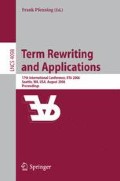Abstract
Bounded Second-Order Unification is the problem of deciding, for a given second-order equation \({t {\stackrel{_?}=} u}\) and a positive integer m, whether there exists a unifier σ such that, for every second-order variable F, the terms instantiated for F have at most m occurrences of every bound variable.
It is already known that Bounded Second-Order Unification is decidable and NP-hard, whereas general Second-Order Unification is undecidable. We prove that Bounded Second-Order Unification is NP-complete, provided that m is given in unary encoding, by proving that a size-minimal solution can be represented in polynomial space, and then applying a generalization of Plandowski’s polynomial algorithm that compares compacted terms in polynomial time.
This research has been partially founded by the CICYT research projects iDEAS (TIN2004-04343) and Mulog (TIN2004-07933-C03-01).
Access this chapter
Tax calculation will be finalised at checkout
Purchases are for personal use only
Preview
Unable to display preview. Download preview PDF.
References
Busatto, G., Lohrey, M., Maneth, S.: Efficient memory representation of XML documents. In: Bierman, G., Koch, C. (eds.) DBPL 2005. LNCS, vol. 3774, pp. 199–216. Springer, Heidelberg (2005)
Comon, H., Dauchet, M., Gilleron, R., Jacquemard, F., Lugiez, D., Tison, S., Tommasi, M.: Tree automata techniques and applications (release 1.10.2002) (1997), available on: http://www.grappa.univ-lille3.fr/tata
Dowek, G.: Higher-order unification and matching. In: Robinson, A., Voronkov, A. (eds.) Handbook of Automated Reasoning, ch. 16, vol. II, pp. 1009–1062. Elsevier Science, Amsterdam (2001)
Farmer, W.M.: Simple second-order languages for which unification is undecidable. Theoretical Computer Science 87, 173–214 (1991)
Goldfarb, W.D.: The undecidability of the second-order unification problem. Theoretical Computer Science 13, 225–230 (1981)
Huet, G.: A unification algorithm for typed λ-calculus. Theoretical Computer Science 1, 27–57 (1975)
Kościelski, A., Pacholski, L.: Complexity of Makanin’s algorithm. J. ACM 43(4), 670–684 (1996)
Levy, J., Niehren, J., Villaret, M.: Well-nested context unification. In: Nieuwenhuis, R. (ed.) CADE 2005. LNCS (LNAI), vol. 3632, pp. 149–163. Springer, Heidelberg (2005)
Levy, J., Schmidt-Schauß, M., Villaret, M.: Monadic second-order unification is NP-complete. In: van Oostrom, V. (ed.) RTA 2004. LNCS, vol. 3091, pp. 55–69. Springer, Heidelberg (2004)
Levy, J., Veanes, M.: On the undecidability of second-order unification. Information and Computation 159, 125–150 (2000)
Levy, J., Villaret, M.: Currying second-order unification problems. In: Tison, S. (ed.) RTA 2002. LNCS, vol. 2378, pp. 326–339. Springer, Heidelberg (2002)
Makanin, G.S.: The problem of solvability of equations in a free semigroup. Math. USSR Sbornik 32(2), 129–198 (1977)
Martelli, A., Montanari, U.: An efficient unification algorithm. ACM TOPLAS 4(2), 258–282 (1982)
Plandowski, W.: Testing equivalence of morphisms in context-free languages. In: van Leeuwen, J. (ed.) ESA 1994. LNCS, vol. 855, pp. 460–470. Springer, Heidelberg (1994)
Plandowski, W.: The Complexity of the Morphism Equivalence Problem for Context-Free Languages. PhD thesis, Department of Mathematics, Informatics and Mechanics, Warsaw University (1995)
Schmidt-Schauß, M.: Stratified context unification is in PSPACE. In: Fribourg, L. (ed.) CSL 2001 and EACSL 2001. LNCS, vol. 2142, pp. 498–512. Springer, Heidelberg (2001)
Schmidt-Schauß, M.: Decidability of bounded second order unification. Information and Computation 188(2), 143–178 (2004)
Schmidt-Schauß, M.: Polynomial equality testing for terms with shared substructures. Frank report 21, Institut für Informatik. FB Informatik und Mathematik. J. W. Goethe-Universität Frankfurt am Main (November 2005)
Schmidt-Schauß, M., Schulz, K.U.: On the exponent of periodicity of minimal solutions of context equations. In: Nipkow, T. (ed.) RTA 1998. LNCS, vol. 1379, pp. 61–75. Springer, Heidelberg (1998)
Schubert, A.: Second-order unification and type inference for church-style polymorphism. In: POPL 1998, pp. 279–288 (1998)
Author information
Authors and Affiliations
Editor information
Editors and Affiliations
Rights and permissions
Copyright information
© 2006 Springer-Verlag Berlin Heidelberg
About this paper
Cite this paper
Levy, J., Schmidt-Schauß, M., Villaret, M. (2006). Bounded Second-Order Unification Is NP-Complete. In: Pfenning, F. (eds) Term Rewriting and Applications. RTA 2006. Lecture Notes in Computer Science, vol 4098. Springer, Berlin, Heidelberg. https://doi.org/10.1007/11805618_30
Download citation
DOI: https://doi.org/10.1007/11805618_30
Publisher Name: Springer, Berlin, Heidelberg
Print ISBN: 978-3-540-36834-2
Online ISBN: 978-3-540-36835-9
eBook Packages: Computer ScienceComputer Science (R0)

